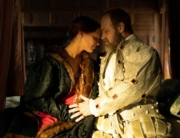Augustine is the third film in as many years about real 19th/early 20th century doctors dealing with women in three European countries who were swept up in a notorious epidemic of severe, incapacitating swooning, and cured through sexual freedom and orgasms. Tanya Wexler’s Hysteria humorously looked at a stuffy British physician who figured out how to treat upper-class women with manual genital manipulation. David Cronenberg’s A Dangerous Method examined how early psychoanalysis helped educated women who could afford liberating sessions in Zurich. From a much more critically feminist angle, debut feature writer/directer Alice Winocour approaches an actual 1885 case in Paris that inspired Freud.
The first difference from the afflicted women in the other films is that this patient, Augustine (Soko), is a kitchen servant. Her restrictions on dress and behavior are further limited by her station in life, too obviously symbolized in the opening scene of a live lobster stuffed into a boiling pot of water and served up bright red at a gluttonous dinner party. The teenage servant becomes the main dish of attention when she collapses into snarling fits with horribly distorted limbs, and she’s sent to the large Salpêtrière hospital for women. The spartan conditions seem luxurious compared to living with nine siblings, and the confinement allows her more free time from working for her middle-class employers, besides offering an incentive to keep exhibiting disturbing symptoms (quite convincingly portrayed).
But in exchange she has to endure humiliating nude examinations observed by formally dressed male medical students, and the renowned founder of neurology, Jean-Martin Charcot (Vincent Lindon), uses her quite condescendingly as a teaching object for a new hypnosis cure. (Abdellatif Kechiche’s Black Venus in 2010 showed French doctors’ similar curiosity for a famous African servant almost a hundred years earlier, while Winocour has the experimenting professor compare Augustine to a monkey.) As in the other films, the cures work because they are, in effect, a rebellion against the sexual repression for both men and women, including the doctor’s jealous corseted wife, Constance (Chiara Mastroianni), and unleash passionate feelings between doctor and patient that disrupt the conventionally settled order of their lives.
What’s different here is Winocour’s use of hand-held camera for a sense of contemporary realism amidst the historically correct costumes and surroundings, and the broad hints that Augustine boldly deploys her symptoms for her own empowerment, either faking what started out as a real condition or making the unconscious conscious in order to engineer her freedom. While the lack of ambiguity gives a feminist iconography to this particular woman who disappeared from medical literature, it makes the broader historical phenomenon seem little more than a charade rather than a real penalty young women “hysterics” suffered from a stultifying society.

















Leave A Comment